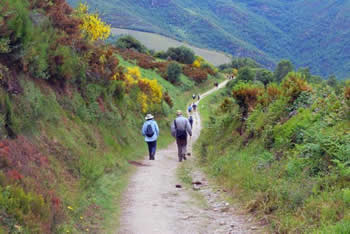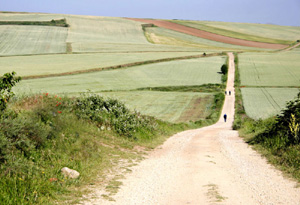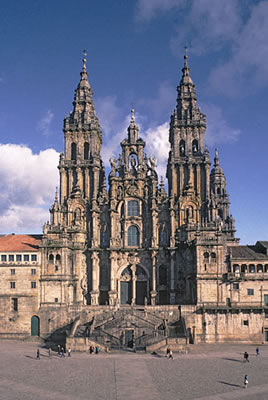Walking the Ancient Way of Saint James:
Expecting the Unexpected
For Sunday June 17, 2012
Lectionary Readings (Revised Common Lectionary, Year B)
1 Samuel 15:34–16:13 or Ezekiel 17:22–24
Psalm 20 or Psalm 92:1–4, 12–15
2 Corinthians 5:6–10, 11–17
Mark 4:26–34
This week my wife and I travel to Spain to walk the 500-mile medieval "Way of Saint James" — in Spanish, "El Camino de Santiago de Compostela." We begin in the southwest corner of France, cross the Pyrenees into Spain, then head west for 33 days — one day for each year in the life of Christ. We'll finish, God-willing, at the Cathedral of St. James in the central square of Compostela, where legend says the bones of St. James are buried. We'll have lots of company; last year 180,000 pilgrims from 140 countries made the trek.
 |
Pilgrims on the Way of St. James. |
The Way of Saint James has been a Christian pilgrimage for over a thousand years. The earliest written reference comes from the year 950, when one Bishop Gotescalco journeyed from France to Compostela. In 1072 King Alfonso VI abolished tolls for pilgrims who made the trip. By the time of Pope Calixtus II (d. 1124), who actively promoted the pilgrimage, the Way of St. James was a well-known route. Around the year 1140, the French priest Aymeric Picaud made the pilgrimage and recorded his experiences in a five-volume illuminated manuscript. Volume 5 of his Codex Callixtus is sometimes called the first ever travel guide. It divides the trip into 13 stages, and gives pilgrims practical advice about the route, works of art, people, and local customs.
Life itself is a sacred journey, of course, and therein lies the power of the pilgrim metaphor. As for the outer journey, I'm looking forward to getting away from my computer, time alone with my wife, physical exercise, and experiencing the history and culture of another country.
Then there's the inner journey. For that I've been thinking about the poet-farmer Wendell Berry. In his poem Sabbath, he writes, "The mind that comes to rest is tended / In ways that it cannot intend." So, as we walk the Way of St. James, I'm expecting the unexpected.
The readings this week explore the unexpected. God works in ways that surprise us.
 |
Pilgrims on the Way of St. James. |
The psalmist's prayer is a little schizophrenic. At first he prays, "May God give you the desire of your heart and make all your plans succeed; may the Lord grant all your requests" (20:4–5). That's not a bad prayer, not by any means. I've prayed it for myself and for others. But I'm also grateful that God did not give me much of what I've asked for. So the psalmist qualifies and deepens the thought: "some trust in chariots and some in horses, but we trust in the name of the Lord our God" (20:7). Better to trust God's providential care for all things large and small than to insist upon success for what you've tried to micro-manage. Wise pilgrims know that many things are beyond their control, and that's ok.
King Saul was a war president: "All the days of Saul there was bitter war with the Philistines." He was also a war profiteer who after defeating the Amalekites took for himself "the best of the sheep and cattle, the fat calves and lambs — everything that was good," all under the pretext of religious piety (1 Samuel 14:52, 15:9). Saul conscripted Israel's children for wars and made them his domestic slaves. He confiscated their lands and imposed exorbitant taxes. He "set up a monument in his own honor" (15:12). Does this ancient story not sound strangely modern?
But divine destiny overshadowed Saul's human decisions, and history did not turn by his own hand. Samuel deposed Saul and anointed the least likely successor. David was the last and the least of Jesse's seven sons. The first six sons had all the marks of regal authority, but the Lord told Samuel: "The Lord does not look at the things that man looks at. Man looks at the outward appearance, but the Lord looks at the heart" (16:7). David might have looked like a lady's man, handsome and "ruddy," but God directed Samuel: "Rise and anoint him; he is the one." God looks at things differently than we do. He does the unexpected.
 |
Cathedral of St. James in Compostela. |
Ezekiel had a strange vision of two eagles and a vine, and a word from the Lord that was even stranger. In the waning days of Israel's kingdom, hapless king Zedekiah broke his treaty with powerful Nebuchadnezzar of Babylon by turning to Egypt for help. No, said Ezekiel, that looks patriotic and brave, but to resist pagan Babylon was to resist the very hand of God. "I the Lord bring down the tall tree and make the low tree grow tall. I dry up the green tree and make the dry tree flourish" (Ezekiel 17:24). Things aren't always what they seem.
And in the gospel for this week, Jesus says that the kingdom of God grows in inexplicable ways. It's like a farmer who scatters seeds. Then, "whether he sleeps or gets up, the seed sprouts and grows, though he does not know how." Sunshine, dirt, and water, then "all by itself," says Jesus, the seed of the kingdom grows. Nor does this require super genetically modified seeds; even a tiny mustard seed produces unlikely giants (Mark 4:26–34). Maybe this is why Paul tells the Corinthians that he would never dare to "commend himself" to them, as if he had somehow bottled the lightning (2 Corinthians 5:12).
As we start our pilgrimage this week, I'm praying that God would meet us in unexpected ways, that as we break away from our normal rhythms of life he would tend to us in ways that we don't even intend. We're praying the pilgrim's prayer from the medieval Codex Callixtus (c. 1140), and invite you to do the same, both for us and for your own life journey.
"God, You called your servant Abraham from Ur in Chaldea, watching over him in all his wanderings, and guided the Hebrew people as they crossed the desert. Guard these your children who, for the love of your Name, make a pilgrimage to Compostela. Be their companion on the way, their guide at the crossroads, their strength in weariness, their defense in dangers, their shelter on the path, their shade in the heat, their light in the darkness, their comfort in discouragement, and the firmness of their intentions; that through your guidance, they may arrive safely at the end of their journey and, enriched with grace and virtue, may return to their homes filled with salutary and lasting joy."
Image credits: (1) TravelDudes.org; (2) 50 up: Life Begins Here; and (3) SacredSites.com.





